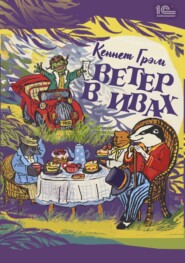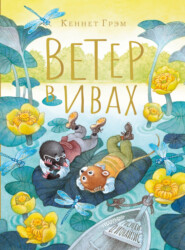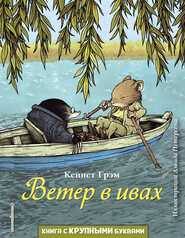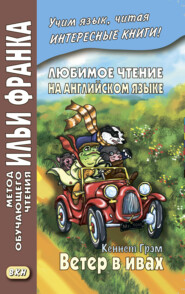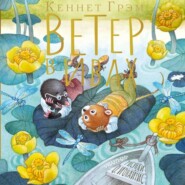По всем вопросам обращайтесь на: info@litportal.ru
(©) 2003-2025.
✖
The Wind in the Willows / Ветер в ивах. Книга для чтения на английском языке
Настройки чтения
Размер шрифта
Высота строк
Поля
Late in the evening, tired and happy and miles from home, they drew up on a remote common far from habitations, turned the horse loose to graze, and ate their simple supper sitting on the grass by the side of the cart. Toad talked big about all he was going to do in the days to come, while stars grew fuller and larger all around them, and a yellow moon, appearing suddenly and silently from nowhere in particular, came to keep them company and listen to their talk. At last they turned in to their little bunks in the cart; and Toad, kicking out his legs, sleepily said, «Well, good night, you fellows! This is the real life for a gentleman! Talk about your old river!»
«I DON'T talk about my river», replied the patient Rat. «You KNOW I don't, Toad. But I THINK about it», he added pathetically, in a lower tone: «I think about it – all the time!»
The Mole reached out from under his blanket, felt for the Rat's paw in the darkness, and gave it a squeeze. «I'll do whatever you like, Ratty», he whispered. «Shall we run away to-morrow morning, quite early – VERY early – and go back to our dear old hole on the river?»
«No, no, we'll see it out», whispered back the Rat. «Thanks awfully, but I ought to stick by Toad till this trip is ended. It wouldn't be safe for him to be left to himself. It won't take very long. His fads never do. Good night!»
The end was indeed nearer than even the Rat suspected.
After so much open air and excitement the Toad slept very soundly, and no amount of shaking could rouse him out of bed next morning. So the Mole and Rat turned to, quietly and manfully, and while the Rat saw to the horse, and lit a fire, and cleaned last night's cups and platters, and got things ready for breakfast, the Mole trudged off to the nearest village, a long way off, for milk and eggs and various necessaries the Toad had, of course, forgotten to provide. The hard work had all been done, and the two animals were resting, thoroughly exhausted, by the time Toad appeared on the scene, fresh and gay, remarking what a pleasant easy life it was they were all leading now, after the cares and worries and fatigues of housekeeping at home.
They had a pleasant ramble that day over grassy downs and along narrow by-lanes, and camped as before, on a common, only this time the two guests took care that Toad should do his fair share of work. In consequence, when the time came for starting next morning, Toad was by no means so rapturous about the simplicity of the primitive life, and indeed attempted to resume his place in his bunk, whence he was hauled by force. Their way lay, as before, across country by narrow lanes, and it was not till the afternoon that they came out on the high-road, their first high-road; and there disaster, fleet and unforeseen, sprang out on them – disaster momentous indeed to their expedition, but simply overwhelming in its effect on the after-career of Toad.
They were strolling along the high-road easily, the Mole by the horse's head, talking to him, since the horse had complained that he was being frightfully left out of it, and nobody considered him in the least; the Toad and the Water Rat walking behind the cart talking together – at least Toad was talking, and Rat was saying at intervals, «Yes, precisely; and what did YOU say to HIM?» – and thinking all the time of something very different, when far behind them they heard a faint warning hum; like the drone of a distant bee. Glancing back, they saw a small cloud of dust, with a dark centre of energy, advancing on them at incredible speed, while from out the dust a faint «Poop-poop!» wailed like an uneasy animal in pain. Hardly regarding it, they turned to resume their conversation, when in an instant (as it seemed) the peaceful scene was changed, and with a blast of wind and a whirl of sound that made them jump for the nearest ditch, it was on them! The «Poop-poop» rang with a brazen shout in their ears, they had a moment's glimpse of an interior of glittering plate-glass and rich morocco, and the magnificent motor-car, immense, breath-snatching, passionate, with its pilot tense and hugging his wheel, possessed all earth and air for the fraction of a second, flung an enveloping cloud of dust that blinded and enwrapped them utterly, and then dwindled to a speck in the far distance, changed back into a droning bee once more.
The old grey horse, dreaming, as he plodded along, of his quiet paddock, in a new raw situation such as this simply abandoned himself to his natural emotions. Rearing, plunging, backing steadily, in spite of all the Mole's efforts at his head, and all the Mole's lively language directed at his better feelings, he drove the cart backwards towards the deep ditch at the side of the road. It wavered an instant – then there was a heartrending crash – and the canary-coloured cart, their pride and their joy, lay on its side in the ditch, an irredeemable wreck.
The Rat danced up and down in the road, simply transported with passion. «You villains!» he shouted, shaking both fists, «You scoundrels, you highwaymen, you – you – roadhogs! – I'll have the law of you! I'll report you! I'll take you through all the Courts!» His home-sickness had quite slipped away from him, and for the moment he was the skipper of the canary-coloured vessel driven on a shoal by the reckless jockeying of rival mariners, and he was trying to recollect all the fine and biting things he used to say to masters of steam-launches when their wash, as they drove too near the bank, used to flood his parlour-carpet at home.
Toad sat straight down in the middle of the dusty road, his legs stretched out before him, and stared fixedly in the direction of the disappearing motor-car. He breathed short, his face wore a placid satisfied expression, and at intervals he faintly murmured «Poop-poop!»
The Mole was busy trying to quiet the horse, which he succeeded in doing after a time. Then he went to look at the cart, on its side in the ditch. It was indeed a sorry sight. Panels and windows smashed, axles hopelessly bent, one wheel off, sardine-tins scattered over the wide world, and the bird in the bird-cage sobbing pitifully and calling to be let out.
The Rat came to help him, but their united efforts were not sufficient to right the cart. «Hi! Toad!» they cried. «Come and bear a hand, can't you![4 - Come and bear a hand, can't you! – Ну же, иди и помоги нам!]»
The Toad never answered a word, or budged from his seat in the road; so they went to see what was the matter with him. They found him in a sort of a trance, a happy smile on his face, his eyes still fixed on the dusty wake of their destroyer. At intervals he was still heard to murmur «Poop-poop!»
The Rat shook him by the shoulder. «Are you coming to help us, Toad?» he demanded sternly.
«Glorious, stirring sight!» murmured Toad, never offering to move. «The poetry of motion! The REAL way to travel! The ONLY way to travel! Here to-day – in next week to-morrow! Villages skipped, towns and cities jumped – always somebody else's horizon! O bliss! O poop-poop! O my! O my!»
«O STOP being an ass, Toad!» cried the Mole despairingly.
«And to think I never KNEW!» went on the Toad in a dreamy monotone. «All those wasted years that lie behind me, I never knew, never even DREAMT! But NOW – but now that I know, now that I fully realise! O what a flowery track lies spread before me, henceforth! What dust-clouds shall spring up behind me as I speed on my reckless way! What carts I shall fling carelessly into the ditch in the wake of my magnificent onset! Horrid little carts – common carts – canary-coloured carts!»
«What are we to do with him?» asked the Mole of the Water Rat.
«Nothing at all», replied the Rat firmly. «Because there is really nothing to be done. You see, I know him from of old. He is now possessed. He has got a new craze, and it always takes him that way, in its first stage. He'll continue like that for days now, like an animal walking in a happy dream, quite useless for all practical purposes. Never mind him. Let's go and see what there is to be done about the cart».
A careful inspection showed them that, even if they succeeded in righting it by themselves, the cart would travel no longer. The axles were in a hopeless state, and the missing wheel was shattered into pieces.
The Rat knotted the horse's reins over his back and took him by the head, carrying the bird cage and its hysterical occupant in the other hand. «Come on!» he said grimly to the Mole. «It's five or six miles to the nearest town, and we shall just have to walk it. The sooner we make a start the better».
«But what about Toad?» asked the Mole anxiously, as they set off together. «We can't leave him here, sitting in the middle of the road by himself, in the distracted state he's in! It's not safe. Supposing another Thing were to come along?»
«O, BOTHER Toad», said the Rat savagely; «I've done with him!»
They had not proceeded very far on their way, however, when there was a pattering of feet behind them, and Toad caught them up and thrust a paw inside the elbow of each of them; still breathing short and staring into vacancy.
«Now, look here, Toad!» said the Rat sharply: «as soon as we get to the town, you'll have to go straight to the police-station, and see if they know anything about that motor-car and who it belongs to, and lodge a complaint against it. And then you'll have to go to a blacksmith's or a wheelwright's and arrange for the cart to be fetched and mended and put to rights. It'll take time, but it's not quite a hopeless smash. Meanwhile, the Mole and I will go to an inn and find comfortable rooms where we can stay till the cart's ready, and till your nerves have recovered their shock».
«Police-station! Complaint!» murmured Toad dreamily. «Me COMPLAIN of that beautiful, that heavenly vision that has been vouchsafed me! MEND THE CART! I've done with carts for ever. I never want to see the cart, or to hear of it, again. O, Ratty! You can't think how obliged I am to you for consenting to come on this trip! I wouldn't have gone without you, and then I might never have seen that – that swan, that sunbeam, that thunderbolt! I might never have heard that entrancing sound, or smelt that bewitching smell! I owe it all to you, my best of friends!»
The Rat turned from him in despair. «You see what it is?» he said to the Mole, addressing him across Toad's head: «He's quite hopeless. I give it up – when we get to the town we'll go to the railway station, and with luck we may pick up a train there that'll get us back to riverbank to-night. And if ever you catch me going a-pleasuring with this provoking animal again!»
He snorted, and during the rest of that weary trudge addressed his remarks exclusively to Mole.
On reaching the town they went straight to the station and deposited Toad in the second-class waiting-room, giving a porter twopence to keep a strict eye on him. They then left the horse at an inn stable, and gave what directions they could about the cart and its contents. Eventually, a slow train having landed them at a station not very far from Toad Hall, they escorted the spell-bound, sleep-walking Toad to his door, put him inside it, and instructed his housekeeper to feed him, undress him, and put him to bed. Then they got out their boat from the boat-house, sculled down the river home, and at a very late hour sat down to supper in their own cosy riverside parlour, to the Rat's great joy and contentment.
The following evening the Mole, who had risen late and taken things very easy all day, was sitting on the bank fishing, when the Rat, who had been looking up his friends and gossiping, came strolling along to find him. «Heard the news?» he said. «There's nothing else being talked about, all along the river bank. Toad went up to Town by an early train this morning. And he has ordered a large and very expensive motor-car».
III. The wild wood
The Mole had long wanted to make the acquaintance of the Badger. He seemed, by all accounts, to be such an important personage and, though rarely visible, to make his unseen influence felt by everybody about the place. But whenever the Mole mentioned his wish to the Water Rat he always found himself put off. «It's all right», the Rat would say. «Badger'll turn up some day or other – he's always turning up – and then I'll introduce you. The best of fellows! But you must not only take him AS you find him, but WHEN you find him».
«Couldn't you ask him here dinner or something?» said the Mole.
«He wouldn't come», replied the Rat simply. «Badger hates Society, and invitations, and dinner, and all that sort of thing».
«Well, then, supposing we go and call on HIM?» suggested the Mole.
«O, I'm sure he wouldn't like that at ALL», said the Rat, quite alarmed. «He's so very shy, he'd be sure to be offended. I've never even ventured to call on him at his own home myself, though I know him so well. Besides, we can't. It's quite out of the question, because he lives in the very middle of the Wild Wood».
«Well, supposing he does», said the Mole. «You told me the Wild Wood was all right, you know».
«O, I know, I know, so it is», replied the Rat evasively. «But I think we won't go there just now. Not JUST yet. It's a long way, and he wouldn't be at home at this time of year anyhow, and he'll be coming along some day, if you'll wait quietly».
The Mole had to be content with this. But the Badger never came along, and every day brought its amusements, and it was not till summer was long over, and cold and frost and miry ways kept them much indoors, and the swollen river raced past outside their windows with a speed that mocked at boating of any sort or kind, that he found his thoughts dwelling again with much persistence on the solitary grey Badger, who lived his own life by himself, in his hole in the middle of the Wild Wood.
In the winter time the Rat slept a great deal, retiring early and rising late. During his short day he sometimes scribbled poetry or did other small domestic jobs about the house; and, of course, there were always animals dropping in for a chat, and consequently there was a good deal of story-telling and comparing notes on the past summer and all its doings.
Such a rich chapter it had been, when one came to look back on it all! With illustrations so numerous and so very highly coloured! The pageant of the river bank had marched steadily along, unfolding itself in scene-pictures that succeeded each other in stately procession. Purple loosestrife arrived early, shaking luxuriant tangled locks along the edge of the mirror whence its own face laughed back at it. Willow-herb, tender and wistful, like a pink sunset cloud, was not slow to follow. Comfrey, the purple hand-in-hand with the white, crept forth to take its place in the line; and at last one morning the diffident and delaying dog-rose stepped delicately on the stage, and one knew, as if string-music had announced it in stately chords that strayed into a gavotte, that June at last was here. One member of the company was still awaited; the shepherd-boy for the nymphs to woo, the knight for whom the ladies waited at the window, the prince that was to kiss the sleeping summer back to life and love. But when meadow-sweet, debonair and odorous in amber jerkin, moved graciously to his place in the group, then the play was ready to begin.
And what a play it had been! Drowsy animals, snug in their holes while wind and rain were battering at their doors, recalled still keen mornings, an hour before sunrise, when the white mist, as yet undispersed, clung closely along the surface of the water; then the shock of the early plunge, the scamper along the bank, and the radiant transformation of earth, air, and water, when suddenly the sun was with them again, and grey was gold and colour was born and sprang out of the earth once more. They recalled the languorous siesta of hot mid-day, deep in green undergrowth, the sun striking through in tiny golden shafts and spots; the boating and bathing of the afternoon, the rambles along dusty lanes and through yellow cornfields; and the long, cool evening at last, when so many threads were gathered up, so many friendships rounded, and so many adventures planned for the morrow. There was plenty to talk about on those short winter days when the animals found themselves round the fire; still, the Mole had a good deal of spare time on his hands, and so one afternoon, when the Rat in his arm-chair before the blaze was alternately dozing and trying over rhymes that wouldn't fit, he formed the resolution to go out by himself and explore the Wild Wood, and perhaps strike up an acquaintance with Mr. Badger.
It was a cold still afternoon with a hard steely sky overhead, when he slipped out of the warm parlour into the open air. The country lay bare and entirely leafless around him, and he thought that he had never seen so far and so intimately into the insides of things as on that winter day when Nature was deep in her annual slumber and seemed to have kicked the clothes off. Copses, dells, quarries and all hidden places, which had been mysterious mines for exploration in leafy summer, now exposed themselves and their secrets pathetically, and seemed to ask him to overlook their shabby poverty for a while, till they could riot in rich masquerade as before, and trick and entice him with the old deceptions. It was pitiful in a way, and yet cheering – even exhilarating. He was glad that he liked the country undecorated, hard, and stripped of its finery. He had got down to the bare bones of it, and they were fine and strong and simple. He did not want the warm clover and the play of seeding grasses; the screens of quickset, the billowy drapery of beech and elm seemed best away; and with great cheerfulness of spirit he pushed on towards the Wild Wood, which lay before him low and threatening, like a black reef in some still southern sea.
There was nothing to alarm him at first entry. Twigs crackled under his feet, logs tripped him, funguses on stumps resembled caricatures, and startled him for the moment by their likeness to something familiar and far away; but that was all fun, and exciting. It led him on, and he penetrated to where the light was less, and trees crouched nearer and nearer, and holes made ugly mouths at him on either side.
Everything was very still now. The dusk advanced on him steadily, rapidly, gathering in behind and before; and the light seemed to be draining away like flood-water.
Then the faces began.
It was over his shoulder, and indistinctly, that he first thought he saw a face; a little evil wedge-shaped face, looking out at him from a hole. When he turned and confronted it, the thing had vanished.
He quickened his pace, telling himself cheerfully not to begin imagining things, or there would be simply no end to it. He passed another hole, and another, and another; and then – yes! – no! – yes! certainly a little narrow face, with hard eyes, had flashed up for an instant from a hole, and was gone. He hesitated – braced himself up for an effort and strode on. Then suddenly, and as if it had been so all the time, every hole, far and near, and there were hundreds of them, seemed to possess its face, coming and going rapidly, all fixing on him glances of malice and hatred: all hard-eyed and evil and sharp.
If he could only get away from the holes in the banks, he thought, there would be no more faces. He swung off the path and plunged into the untrodden places of the wood.







